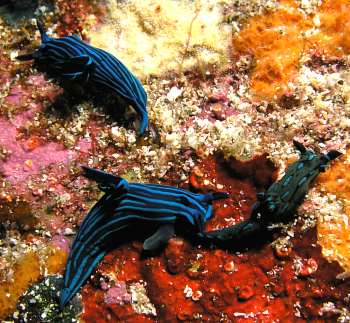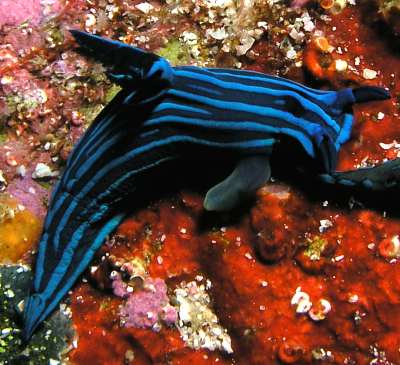Species of Tambja from the Galapagos Ids
June 13, 2005
From: Pam McPherson

My name is Pam McPherson and I am an instructor on the Kona Aggressor II in Hawaii. I am very "ill" because I have been bitten by the malacology bug and I need help in identifying a nudibranch.
I took the attached photographs on a recent trip to the Galapagos Ids. I have looked in all of the nudibranch identification books and asked the local divemasters and nobody seems to know anything about this nudibranch. Have you seen it before? Can you identify it?'
As you can see in the second photograph, it seems that the Blue-Lined Galapagos Nudibranch (Tambja mullineri ) was attempting to mate with it. Is it common for different breeds of nudibranchs to mate?
Locality: Wolf Island, Galapagos, Ecuador, East Pacific. Depth: 60 feet. Length: One inch. 7 March 2005. reef wall. Photographer: Pam McPherson
Please let me know your thoughts!
Avid nudibrancher desperately awaiting your response -
Pam McPherson
pammcp1@yahoo.com


Dear Pam,
Your spotted animal is Tambja eliora, which I discuss in a separate message [#14023]. As far as I know it has not been recorded from the Galapagos Ids before, so that is an interesting find.
There are three species of Tambja with similar colour patterns in the East Pacific. In Tambja mullineri the black gills have a blue outer face and a thin blue line along the inner edge. In T. eliora the outer edge to each gill is coloured khaki in the basal half and bright turquoise blue in the upper half. In T. abdere the outer face of each gill is yellowish and the gill lamellae are a translucent pinkish purple with a blackish tip. There are of course other differences but the gill colour sems to be fairly consistent. Both T. abdere and T. eliora have lined and spotted colour 'forms' but so far, the nearest we have to a spotted form of T. mullineri is the photo in message #12889.
Concerning species mating together. Cross-species mating is certainly not usual. Part of the definition of a species is that it is an isolated genetic entity, and one way to reinforce that are physical and behavioural barriers to interspecies matings. When these barriers break down the off-spring are usually sterile. I think in your photo it is most likely that the lower T. mullineri, with penis everted, has been mating, or at least 'courting' with the upper T. mullineri, rather than with the T. eliora.
Best wishes,
Bill Rudman
Related messages
-
More on Tambja mullineri from the Galapagos
From: Zeineb Alhaidari, October 21, 2008 -
Tambja mullineri from Galapagos
From: Clarke Duncan, April 26, 2006 -
Tambja mullineri from Galapagos
From: Julianne Parolisi, January 3, 2005 -
Tambja mullineri from Galapagos
From: Patty Dilworth, January 23, 2004
